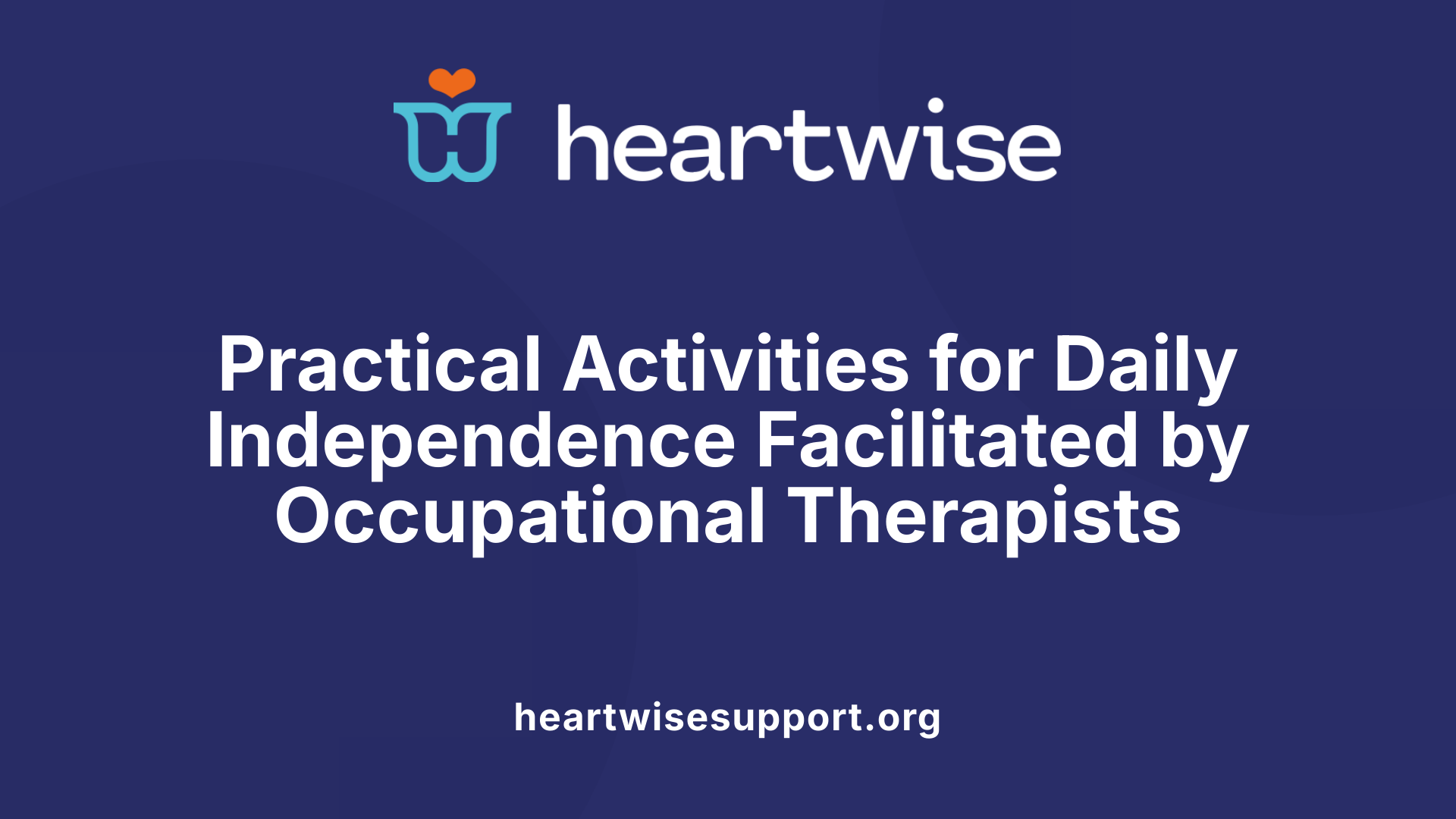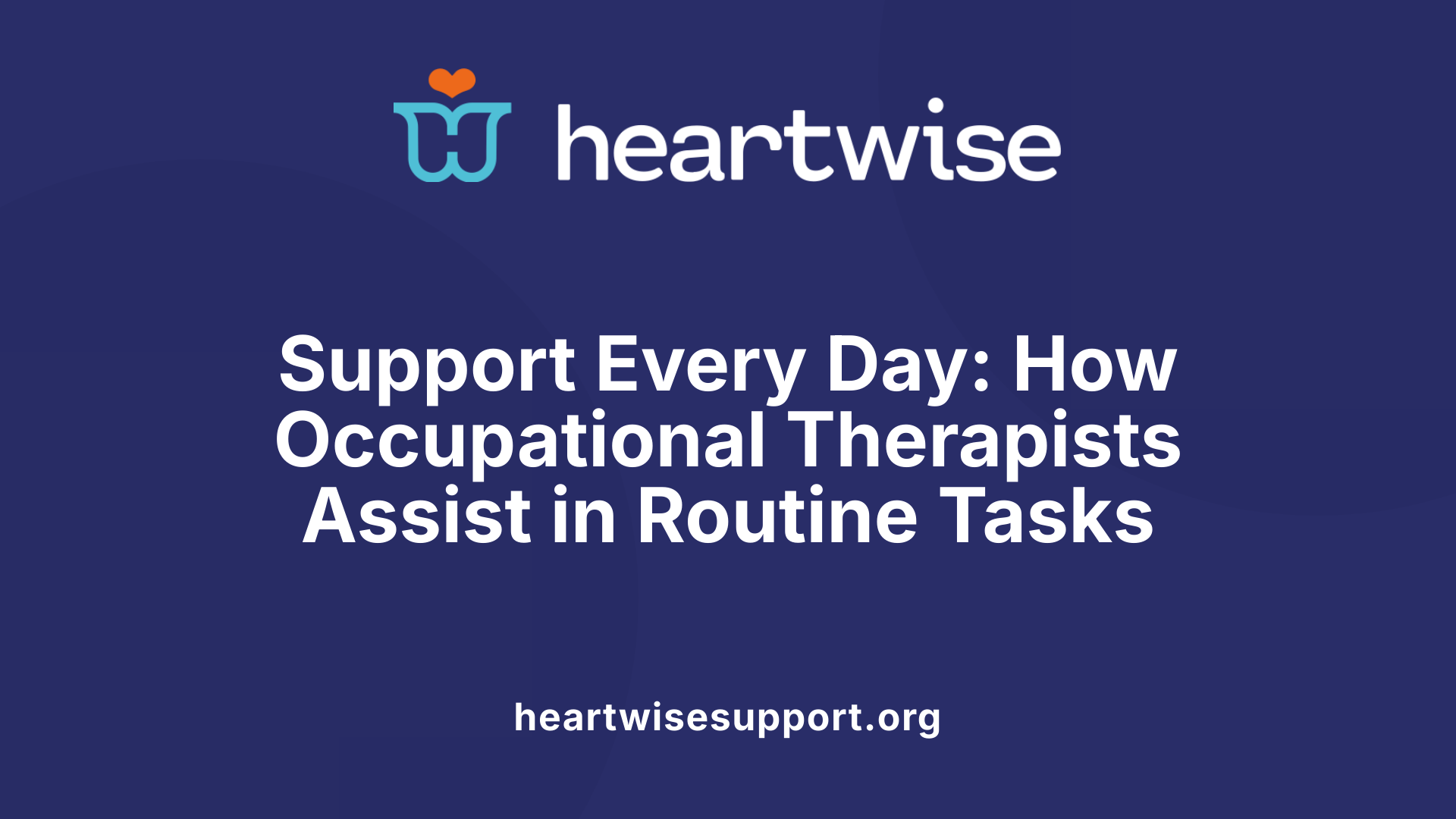Unlocking Independence with Tailored Support
Occupational therapy (OT) is a vital healthcare service dedicated to helping individuals achieve greater autonomy and improve their quality of life. By focusing on realistic, meaningful activities—referred to as 'occupations'—OT is instrumental in assisting people of all ages, especially those recovering from injuries, managing chronic conditions, or facing age-related limitations, to regain and develop essential daily living skills. This article explores how occupational therapy facilitates independence, the methods used, and the profound impact it has across diverse populations.
Activities Facilitated to Enhance Daily Living Skills

What activities do occupational therapists facilitate to improve daily living skills?
Occupational therapists put a strong focus on helping individuals develop, recover, or maintain the skills necessary for everyday independence. Their interventions encompass a broad array of activities aimed at enhancing the ability to perform daily tasks safely and confidently.
One of the primary areas targeted by OTs is personal care routines. This includes teaching and practicing dressing, grooming, bathing, and toileting. Therapists often introduce adaptive devices such as buttonholers, built-up utensils, and grab bars, and suggest environmental modifications like accessible sinks or shower chairs to foster independence.
Meal preparation and cooking are also crucial components. OTs guide clients in using adaptive tools like ergonomic utensils, memory aids, and visual schedules to simplify cooking tasks. They may incorporate exercises that strengthen fine motor skills, improve hand-eye coordination, and enhance cognitive planning skills needed for safety and efficiency in the kitchen.
Laundry and household chores are essential for maintaining a safe and comfortable home environment. Occupational therapists teach energy conservation techniques, organization skills, and use of assistive devices, such as reachers or low-difficulty laundry baskets, to make these tasks more manageable.
The use of adaptive strategies and tools greatly enhances independence. These include adjustable utensils, non-slip mats, modified furniture, and assistive technologies that support specific needs, such as memory aids or sensory tools.
Each person's unique needs are carefully assessed through individualized evaluations. Based on this, therapists develop personalized treatment plans.
In children, interventions often involve playful activities that promote fine motor development, sensory integration, and task sequencing. For older adults, therapy emphasizes fall prevention, cognitive engagement, and maintaining self-care routines.
Specialized programs like transition planning, sensory processing strategies, and aquatic therapy are tailored to address specific challenges, helping individuals gain essential daily living skills.
Caregiver involvement is also vital. OTs teach family members adaptive techniques and environment modifications, ensuring that improvements are supported at home.
In summary, occupational therapists facilitate activities such as dressing, feeding, bathing, laundry, and meal preparation. They utilize therapeutic exercises, adaptive equipment, and environmental adjustments to foster independence and improve quality of life for individuals of all ages.
The Role of Occupational Therapists in Daily Task Assistance

What is the role of occupational therapists in helping individuals with daily living tasks?
Occupational therapists (OTs) are essential professionals dedicated to supporting individuals in regaining, developing, or maintaining the skills required for everyday activities. Their work is centered around helping people overcome physical, cognitive, or emotional barriers that impede their ability to perform routine tasks.
Initially, OTs conduct comprehensive assessments of each client’s specific needs. These evaluations examine physical abilities—including joint movement, sensation, and strength—as well as cognitive functions like memory, attention, and problem-solving skills. The assessment process also considers environmental factors such as home setup and available assistive tools. Based on these insights, therapists develop personalized intervention plans tailored to the unique circumstances and goals of each individual.
Interventions often encompass a range of strategies aimed at improving or compensating for challenges. Physical exercises focus on enhancing motor skills, coordination, and balance—crucial for activities like dressing, cooking, or bathing. Cognitive rehabilitation activities strengthen memory, attention, and organizational skills essential for managing household tasks or employment.
To facilitate independence, occupational therapists introduce adaptive equipment such as grab bars, ergonomic utensils, or mobility aids. They also recommend and implement environmental modifications—like installing ramps, removing tripping hazards, or adjusting lighting—to make spaces safer and more accessible.
Their support extends beyond hospitals and clinics. In homes, OTs educate clients and caregivers on using assistive devices and modifying daily routines. In community programs or senior living facilities, they work to promote social engagement, prevent falls, and improve overall well-being.
In addition to physical and environmental interventions, occupational therapists provide emotional support. Navigating health-related changes can be challenging, and therapists help individuals cope with frustrations, mental health issues, or feelings of loss of independence.
Collaboration is vital in occupational therapy. OTs work closely with a multidisciplinary team that can include physical therapists, speech-language pathologists, psychologists, and physicians. Together, they aim to formulate a holistic approach to health, emphasizing active participation in meaningful occupations—whether that’s self-care, work, hobbies, or community involvement.
Occupational therapy is versatile and adaptable, suitable for people of all ages—from children with developmental delays to seniors managing chronic conditions. The overarching goal is to empower individuals to perform daily tasks safely and confidently. By doing so, occupational therapists significantly improve quality of life, promote independence, and support active engagement in all facets of life.
Main areas where occupational therapists assist in daily activities:
| Area of Support | Typical Interventions | Examples |
|---|---|---|
| Personal Care | Adaptive equipment, skill training | Dressing, grooming, bathing |
| Household Tasks | Environmental modifications, routines | Cooking, cleaning, managing finances |
| Mobility & Transfers | Balance exercises, assistive devices | Walking, transferring from bed to wheelchair |
| Cognitive Tasks | Memory aids, problem-solving exercises | Managing medication, planning errands |
| Community & Social Engagement | Social skill training, accessible transport | Participating in social clubs or events |
Ultimately, occupational therapists focus on bridging the gap between individual abilities and the demands of daily life. They foster a sense of achievement and autonomy that profoundly impacts overall health and happiness.
Developing Critical Skills for Independent Living

What are some specific independent living skills that occupational therapists help develop?
Occupational therapists play a vital role in helping individuals build a variety of skills necessary for daily independence. They focus on essential personal care routines such as dressing, grooming, hygiene, and toileting. These fundamental activities form the cornerstone of maintaining personal dignity and self-sufficiency.
Beyond personal care, OTs assist clients in mastering meal preparation skills, including chopping, cooking, and safe food handling. They teach strategies to simplify tasks, use adaptive utensils, and implement safety measures in the kitchen.
Household chores and home management are also key areas. Therapists provide guidance on cleaning, laundry, organizing living spaces, and managing household bills. They often introduce visual schedules, routines, and cognitive strategies to help clients manage complex household tasks.
OTs also support clients in developing community participation skills. This includes using public transportation, attending social activities, and visiting community centers confidently and safely.
To promote overall independence, therapists tailor interventions to each individual’s needs. This may involve recommending adaptive devices such as grab bars or shower chairs, and teaching safety techniques in various settings.
By strengthening motor skills, coordination, and social participation, occupational therapy aims to make daily living manageable and enjoyable. The ultimate goal is to help individuals function safely and effectively in their environments, fostering self-reliance and improving quality of life.
Promoting Autonomy Through Personalized Interventions

How can occupational therapists promote independence?
Occupational therapists (OTs) play a crucial role in helping individuals regain and maintain independence in their daily lives. They start with thorough assessments to understand each person's unique needs, challenges, and environment. This evaluation may include checking physical strength, motor skills, cognitive abilities, sensation, pain levels, and home setup.
Based on these assessments, OTs develop tailored treatment plans that focus on restoring skills, modifying tasks, or adapting environments. They teach clients techniques to improve physical abilities such as strength, coordination, and balance, often through exercises and functional activities.
In addition, cognitive strategies are integrated into therapy to enhance memory, organization, and problem-solving skills. This comprehensive approach helps individuals perform daily tasks more effectively and confidently.
OTs also recommend and train with assistive devices and adaptive equipment—such as ergonomic utensils, shower chairs, or grab bars—and suggest home modifications like ramps or safety strips to improve accessibility and safety at home.
Mental health support is another vital component. OTs address emotional and social aspects, helping clients cope with frustrations or feelings of loss of independence. Building self-esteem and confidence is emphasized through encouragement, education, and community participation.
Furthermore, occupational therapists advocate for community engagement, fostering social connections through participation in hobbies, volunteer work, or group activities. This social inclusion reduces isolation and supports emotional well-being.
By combining physical, cognitive, emotional, and social strategies, OTs effectively promote sustained independence across different settings—whether at home, work, or in the community. Their holistic, personalized approach ensures that individuals can live more fulfilling, autonomous lives.
Impact of Occupational Therapy on Quality of Life

How does occupational therapy impact quality of life and personal independence?
Occupational therapy (OT) plays a crucial role in enhancing the overall quality of life for individuals of all ages. By helping people develop, recover, or maintain essential daily skills, OT fosters independence in everyday activities such as dressing, cooking, personal care, and community participation.
One of the significant benefits of OT is its holistic approach. Therapists assess physical, cognitive, emotional, and environmental factors to tailor personalized intervention plans. These may include restorative exercises to improve motor skills, cognitive training to boost memory and problem-solving, and environmental modifications to make homes and workplaces safer and more accessible.
Group-based OT programs are particularly effective in improving emotional well-being. Engaging in shared activities can increase self-efficacy, reduce feelings of isolation, and promote social connections, which are vital for mental health. For example, seniors participating in community-based OT activities often report increased self-confidence and a sense of purpose.
Environmental adjustments such as installing grab bars, removing tripping hazards, or adapting workspaces help individuals to perform daily tasks more safely and efficiently. Education and training are integral to OT, empowering patients and caregivers with strategies to manage conditions and perform routines independently.
Ultimately, occupational therapy helps bridge the gap between physical and cognitive abilities and the demands of daily living environments. This comprehensive support not only aims to improve physical and mental functions but also encourages active engagement in community life.
By addressing barriers holistically—physical, psychological, and environmental—OT significantly enhances personal independence and life satisfaction. It nurtures a feeling of achievement and control, which are fundamental to psychological health.
Through personalized and group approaches, OT fosters a well-rounded improvement in health and well-being. This leads to increased participation in meaningful activities, which is essential for emotional resilience and overall happiness.
In summary, occupational therapy’s impact on quality of life and personal independence is profound. It provides individuals with the tools, skills, and support necessary to live more autonomous, fulfilling lives, regardless of age or health conditions. The focus on tailored interventions and environmental adaptations ensures that each person can reach their fullest potential in daily living and community engagement.
Fostering Independence for a Better Future
Occupational therapy stands as a cornerstone of modern healthcare, evolving to meet the diverse needs of individuals seeking to enhance their independence and quality of life. Through personalized assessments, innovative interventions, and community integration efforts, occupational therapists empower clients to perform daily activities safely and confidently. Whether supporting seniors to age in place, helping children with developmental challenges, or aiding recovery from injuries, OT's holistic approach ensures that everyone can participate fully in their personal and community lives. As awareness and access to these essential services grow, the future promises a society where independence is within everyone's reach, fostering healthier, happier lives.
References
- How Occupational Therapy Helps People Regain Independence
- Occupational Therapy: Empowering Independence and Quality of Life
- Occupational Therapy Interventions to Improve Activities of Daily ...
- Occupational Therapy Helps Maximize Safety, Independence, And ...
- Occupational Therapists Improve Daily Life - Kettering College
- What is Occupational Therapy? - Creative Solutions in Healthcare
- The Role of Occupational Therapy in Enhancing Daily Living Skills
- How Therapy Builds Daily Life Skills for Individuals with IDD











